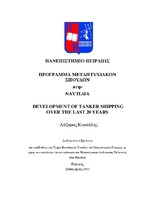| dc.description.abstract | We live in a world where people started to trade different kinds of goods since the
ancient years. Many of these people began to think that they had to find a way
allowing them to import and export goods at the place they lived and satisfy their needs
(Chrzanowski, I., 2002). It is common knowledge that there are countries that do not
produce all the kind of goods that their people require in order to satisfy their needs and
therefore one should find a means of transport in order to transport different kind of
commodities from one place to another. Faced with this problem, people thought that
the best solution for this problem would be the use of vessels and the carriage of goods
by sea.
The sea transport from the early ages until our era continues to be a means of transport
which can offer some reliable solutions for the transport of different cargoes around the
world and sometimes these transports may be realized in a quick transit time. All
analysts who are focused on the shipping industry have observed that since the
beginning of the trade by sea, there is a development in the way that these transports
are made and also a development at the vessels which affected and continue to affect
the transports realized.
During the development of sea transport, vessels and services have been categorized, in
order to guarantee better performance and in order for ship-owners be in a position to
choose the best suitable seafarers for their ships. However, irrespective of the vessels
that will be used according to the sea transport of each commodity, there is also a sector
inside shipping industry which is concerned with the development and operation of
tankers during the last 20 years.
Thirty seven percent of the world wide dead weight tonnage (DWT) is located on the
tanker sector, dealing with the profitable trade of oil. The use of such vessels is
imperative for the transport of liquid products in bulk, such as oil and its derivatives.
Tanker vessels have several peculiarities that we will in the present try to underline and
explain, in order to understand the differences and evolution of their intended use over
the last twenty years | |



